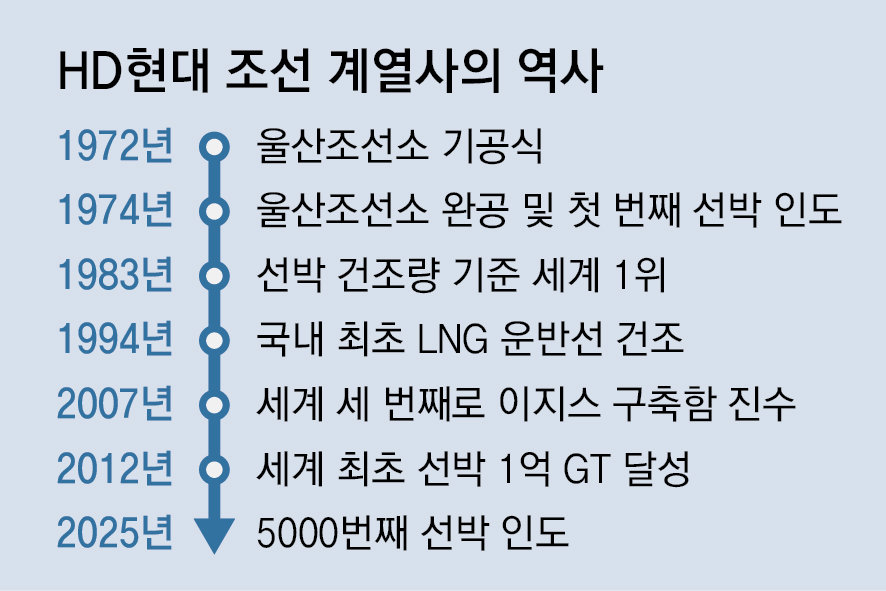Delivering a patrol ship to the Philippines marks a milestone
5,000 ships lined up would stretch 1,250 km
Supplied to 68 countries and over 700 shipping companies
Regular line: "A historic challenge that changed the paradigm"… Gift vouchers for affiliate and partner company employees
The second patrol vessel 'Diego Silang' of the Philippine Navy, the 5000th ship delivered by HD Hyundai. Provided by HD Hyundai
HD Hyundai has become the first shipbuilder specializing in medium to large vessels to deliver its 5000th ship to a customer. This milestone comes 51 years after delivering its first ship in 1974. It is seen as a symbol of the development of the Korean shipbuilding industry, which rose to become the world's number one from a latecomer trailing behind Japan and Europe.
HD Hyundai announced on the 19th that its shipbuilding subsidiary HD Hyundai Heavy Industries achieved the delivery of the 5000th ship at the group level by handing over the patrol vessel 'Diego Silang' to the Philippine Navy last month. While the Dutch Damen Shipyards Group, which mainly produces non-mainstream small vessels like fishing boats, surpassed 5000 deliveries a decade ago, this is the first time a shipbuilder focused on medium to large vessels has achieved such a record.
If the length of one ship is uniformly applied as 250 meters, lining up 5000 ships would reach a total length of 1250 km, longer than the direct distance from Seoul to Tokyo, Japan (approximately 1150 km). By subsidiary, HD Hyundai Heavy Industries delivered 2631 ships, HD Hyundai Mipo, specializing in medium-sized ships, delivered 1570 ships, and HD Hyundai Samho, specializing in large merchant ships, delivered 799 ships to customers.
The delivery of 5000 ships by HD Hyundai is significant not merely as an achievement of an individual company but as a part of the entire history of 'K-Shipbuilding'. The first chapter began in 1972 when the late honorary chairman of Hyundai Group, Chung Ju-yung, pursued the construction of a shipyard in Ulsan Mipo Bay. At that time, the Korean shipbuilding industry accounted for less than 1% of the global market share. The story of Chairman Chung persuading a British bank official by showing a 500 KRW bill with a turtle ship on it to secure construction funds is still famous today.

Two years later, in 1974, HD Hyundai Heavy Industries completed the Ulsan Shipyard and delivered its first ship, the 260,000-ton class tanker 'Atlantic Baron', to a Greek shipowner, marking the start of its full-scale business. After reaching the world's number one in shipbuilding volume (2.226 million tons) in 1983, it became the first in the world to surpass a cumulative shipbuilding volume of 100 million GT (gross tonnage) in 2012. HD Hyundai has delivered ships to a total of 68 countries and over 700 shipowners.
Recently, HD Hyundai's flagship product line consists of highly profitable ship types. HD Hyundai Mipo's main product, the Liquefied Natural Gas (LNG) carrier, is a ship designed to transport liquefied gas at an ultra-low temperature of minus 163 degrees Celsius, requiring advanced technology. Korean shipbuilders hold a 70% market share in this 'export champion' ship type in the global market. Ultra-large container ships of 10,000 TEU (1 TEU is one 20-foot container) or more are the main products of HD Hyundai Heavy Industries, with high demand due to their role in transporting most of the world's cargo volume.
To celebrate the delivery of the 5000th ship, HD Hyundai decided to give gift certificates worth KRW 300,000 to employees of its shipbuilding subsidiaries as well as partner company employees. This initiative was reportedly proposed by HD Hyundai Chairman Chung Ki-sun. At the commemorative event held at the Ulsan HD Hyundai Heavy Industries headquarters on the 19th, Chairman Chung stated, "The delivery of 5000 ships is a pride of the Korean shipbuilding industry and a history of challenges that changed the paradigm of the global maritime industry," adding, "We will advance towards the next 5000 ships."
ⓒ dongA.com. All rights reserved. Reproduction, redistribution, or use for AI training prohibited.
Popular News
